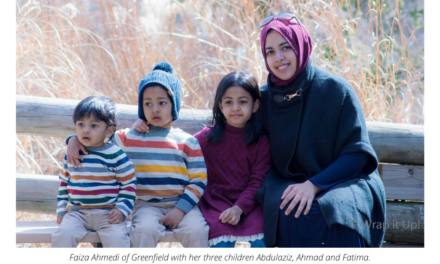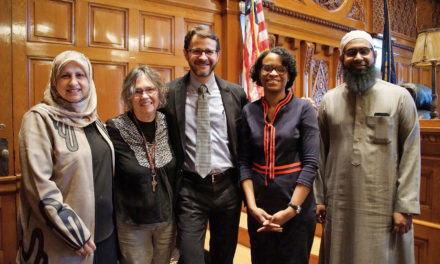
Graphics courtesy of Wisconsin Muslim Civic Alliance
Wisconsin Muslim Civic Alliance shared the results at a public meeting last week of the state’s first survey of Wisconsin Muslims that focuses on political engagement and concerns.
A new survey finds Wisconsin Muslims more likely to actively participate in the electoral process than the general Wisconsin public and that a strong commitment to religious beliefs drives their civic behavior, including their votes.
Wisconsin Muslim Civic Alliance, a nonprofit organization that works to empower the Wisconsin Muslim community in political and civic engagement, released the results of the first statewide survey of Muslim political interest and views Thursday in an online public meeting. State Sen. Chris Larson (D-Milwaukee) and State Rep. Ryan Clancy (D-Milwaukee) attended in addition to stakeholders from the Muslim community.

The majority of Wisconsin Muslims feel informed about the voting process.
WMCA conducted the survey from Sept. 2, 2023, to Nov. 28, 2023, to offer guidance for policymakers, corporations, media organizations and individuals aiming to deepen their understanding and support for the Wisconsin Muslim Community, WMCA interim executive director Gabriella Suliga wrote in the introduction to a draft of the report shared yesterday with the Wisconsin Muslim Journal. The report will be made public upon completion soon, she said.
For updates on the survey and future WMCA events, Suliga suggested anyone interested sign up for the WMCA newsletter on its website and follow its Facebook page.




Survey results at a glance
In summary, the survey shows Wisconsin Muslims:
- Demonstrate a strong commitment to their religious beliefs, influencing their perspectives on various political issues.
- Have diverse political affiliations.
- Make political decisions on individual issues rather than party agendas.
- Exhibit financial generosity toward civic and political organizations.
- Are more likely to participate actively in the electoral process than the general Wisconsin public.
- Display higher educational attainment and employment status, often reflecting higher socioeconomic status and better access to healthcare, compared to the general Wisconsin public.
- Demonstrate a prevalence of multilingualism.
- Include a significant portion of community members born outside the United States.
- Are younger than the general Wisconsin public.
- Are more likely to be victims of hate crimes and violence compared to the general Wisconsin public.


Wisconsin Muslims have more education and household income than Wisconsin’s general public.
“I think what’s most interesting and most exciting is the finding, that we have known, that it’s a younger community with the potential to become much more active politically,” WMCA founder Janan Najeeb said in the online meeting. “That’s very exciting.”

Gabriella Suliga, Wisconsin Muslim Civic Alliance interim executive director
Wisconsin Muslims are a far younger demographic compared to the state as a whole,” Suliga said, “with 38% ages 18 to 35, 40% ages 36 to 55 and 21% ages 55 and up.”
On the issues, the overwhelming majority of Wisconsin Muslims said healthcare, education and the economy are their top issues followed by gun violence, Islamophobia, foreign policy, climate and civil rights.
“It’s important to note the survey was conducted before Oct. 7 and everything that happened since,” Suliga noted, referring to Hamas’ surprise attack on Israel and the Israeli military’s brutal bombardment on Gaza that has taken more than 26,000 lives to date. She plans to propose to WMCA to conduct “a short survey simply on that issue. It will show what the top issues are for Muslims heading into the polls in 2024. I would be curious to see the changes.”
How it was done
WMCA conducted the survey both online and via phone. Online surveys were entirely anonymous, with no identifying information collected from the respondents.
WMCA collected surveys from 416 Wisconsin Muslim adults (over the age of 18) from 12 counties: Brown, Dane, Dunn, Grant, La Crosse, Manitowoc, Marathon, Milwaukee, Ozaukee, Racine, Sheboygan and Waukesha.


The survey’s margin of error is +/- 5 percentage points. The margin of error is the range within which one may have 95% confidence the true percentage is found. An acceptable margin of error used by most survey researchers typically falls between 4% and 8% at the 95% confidence level, according to Appinio, a marketing research firm.
The survey was translated into seven languages—English, Punjabi, Bangla, Arabic, Spanish, Urdu and Somali—to ensure accessibility to a diverse range of respondents, the report noted..
Online surveys, an effective means of gathering many respondents, come with limitations, the report noted. One is that respondents self-select to participate.


“To mitigate this, targeted outreach was conducted to specific demographic groups via phone,” the report said. “Additionally, the survey team monitored key demographics to ensure a representative sample, including age, race, income, and political affiliation. It used a statistical process of weighting the data to smooth out any additional unevenness.”

Why survey Wisconsin Muslims?
“We are heading into an important election year, where candidates will seek the trust and votes of the public,” Suliga said in email correspondence with WMJ. “As a critical swing state, every vote matters. It’s vital that candidates and elected officials understand the interests of their Muslim constituents.”

For WMCA, “leading a political organization requires informed decision-making, and this survey provides data that will shape our priorities moving forward,” Suliga said.
And this data is not just important for WMCA but for other stakeholders as well, she noted. “Since the report will be made public, it is our hope that organizations will leverage the information to better support Wisconsin Muslims. It’s a foundational step towards a more informed and collaborative community.”














